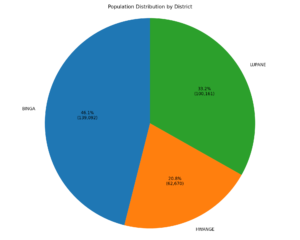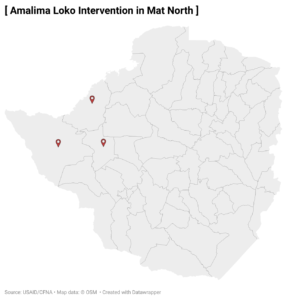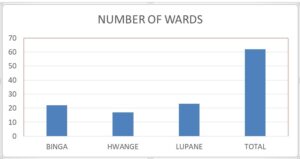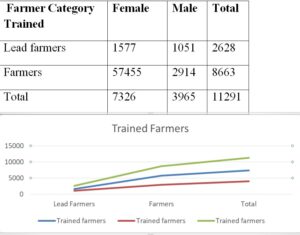Thembelihle Mhlanga
Hwange—Unpredictable rainfall, recurring droughts, a fragile ecosystem and destructive floods put Binga, Lupane and Hwange districts in Matabeleland North province among the most vulnerable in Zimbabwe.
The Zimbabwe National Statistics Agency (ZIMSTAT) puts the combined population of these three predominantly rural districts at 336,000.
Binga has 139 092 people, Hwange accounts for 62670 while Lupane has a population of 100161, according to ZIMSTAT records for 2022.

Source: ZIMSTATS 2022 Census
Over the decades, changing climate has negatively affected agricultural productivity, food security, and community livelihoods.
Household income is acutely low, it is difficult to engage in meaningful farming on this parched patch of the Zimbabwean map, hunger is widespread, and so is poverty.
It is not gloom and doom, though.
The Amalima Loko project covering the three districts is providing hope and relief to the local communities as it seeks to protect and enhance livelihoods and the resilience of the residents of Hwange, Lupane and Binga.
“Amalima Loko” is a fusion of Ndebele and Tonga words, with “Amalima” meaning “working as a team”, while “Loko means “true”.
This project started in 2020 and is set to end in 2025.
In the face of mounting climate challenges, the Amalima Loko project, funded by the US Agency for International Development (USAID) and implemented by Cultivating New Frontiers in Agriculture (CFNA), is making significant strides in empowering communities in the three districts.
The project is funded to the tune of US$75 million to promote climate adaptation and resilience in the area.

The project covers 62 wards—22 in Binga, 17 in Hwange and 23 in Lupane—as it seeks to cushion the benefiting communities against the biting effects of climate change.

Source: CNFA communications office
Working with a private sector actor, Zimplow, and Agritex representatives, Amalima Loko trained 2,628 (1,051 male; 1,577 female) lead farmers on water harvesting, soil and water conservation, and the use of labor-saving methodologies for agricultural practices.
The lead farmers are a select group of farmers who deploy the skills they would have acquired to mentor others.
The lead farmer training included ripping, use of tied ridges, making infiltration pits and dead level contours, pot-holing and the use of vetiver grass for soil and moisture conservation.
Agritex and Amalima Loko established 96 demonstration plots (0.1ha/plot) to show mechanized agriculture and soil and water conservation techniques all-embracing conservation and smart agriculture.
Lead farmers in turn trained 8,663 additional farmers, with 2,914 being males and 5,749 females, according to USAID. 
Community Irrigation Projects
According to the Amalima Loko Matabeleland North office, the project has helped set up irrigation projects whereby the beneficiaries are growing a variety of horticultural crops that include cabbage, butternut, choumoellier and numerous greens.
The project established one three-hectare irrigation initiative in Lupane, three of the same size in Binga and another three in Hwange.
The irrigation projects have produced a variety of vegetables to boost the nutritional levels of the surrounding communities.

Borehole drilling and rehabilitation

Alongside the focus on sustainable agriculture, the Amalima Loko project has made significant strides in improving natural resource management across the three districts.
In Hwange, the project has rehabilitated 60 boreholes and drilled an additional 26, providing communities with reliable access to clean water. (Hwange District CNFA )
The boreholes are now benefiting upward of 18 000 people, with women in particular celebrating the development since they used to spend long hours travelling to fetch water from far-off sources.
“The borehole rehabilitation has been a lifesaver for us,” says Siphiwe Ncube, a community member from Hwange. “We no longer have to walk long distances to fetch water, and our livestock have a steady supply throughout the year.”
Similarly, in Lupane district, the project has rehabilitated 60 boreholes and drilled 23 new ones, significantly improving water access for the local communities as some 11 000 people are now benefiting. ( Lupane District CNFA )
| DISTRICT | NUMBER OF BOREHOLES | POPULATION SERVED |
| BINGA | 88 | 18628 |
| HWANGE | 86 | 18000 |
| LUPANE | 83 | 11456 |
| TOTAL | 257 | 48084 |
“The boreholes have been a game-changer, especially during the dry season,” explains Thembani Ndlovu, a resident of Lupane. “We can now focus on our farms and gardens, knowing that our families and livestock have the water they need.”
“The new boreholes have transformed our lives,” says Siabaule Mpande, a benefiting community member from Binga. “We no longer have to worry about water shortages, and our children can focus on their education instead of spending hours fetching water.”[CNFA Communications Office]
Availability of borehole water has given a lease of life to horticulture farmers who are growing a variety of vegetables for domestic consumption and sale to fellow community members.
The income realised from the sale of the produce is used to buy staple foods and essential commodities.

Source: Rural Infrastructure Development Agency Matabeleland North
In addition to the borehole rehabilitation and drilling initiatives, the project has supported the construction of one water harvesting and irrigation scheme (WIRS) in each of the three districts.
These WIRS projects have capacitated the communities to store and effectively utilize water for both domestic and agricultural purposes, further enhancing their resilience to recurrent droughts.
Says Tendai Muzamba, a lead farmer from Binga: “Our crop yields have increased, and we’re better able to withstand the erratic weather patterns.”
Similarly, in the Hwange district, where 87% of the farmers have participated in the project’s interventions, the adoption of conservation farming has been transformative.
“Before Amalima Loko, we were struggling to produce enough food to feed our families,” explains Lebani Moyo, a community leader from Hwange.
Lupane district has also seen impressive results, with 80% of the farmers participating in the project’s sustainable farming initiatives.
“The introduction of drought-tolerant crops and agroforestry practices has been a game-changer for us,” says Nkosikazi Ncube, a farmer from Lupane. “We’re now able to produce reliable harvests, even during the prolonged dry spells.”
In Hwange, the project has facilitated the establishment of one WIRS, enabling farmers to sustainably irrigate their crops and diversify their production.
Says Themba Shoko, a community leader from Hwange: “We’re now able to grow a variety of crops, including high-value vegetables and this has significantly improved our food security and incomes.”
In Lupane district, the project has supported the construction of one WIRS, which has been instrumental in helping farmers adapt to the changing rainfall patterns.
“The WIRS has allowed us to store water and use it efficiently for our crops,” explains Thembani Ndlovu, a resident of Lupane. “We’ve been able to diversify our production and increase our yields, even during the dry spells.”
Similarly, in the Binga district, the Amalima Loko project has facilitated the establishment of one WIRS, which has empowered the local communities to take charge of their own climate change adaptation efforts.
“We’re now able to grow a variety of crops, including high-value vegetables (and that) has not only improved our food security but also provided us with additional sources of income,” says Sinikwe Ncube from Binga.
Impact of the Amalima Loko project is evident in the improved food security, livelihoods, and growing resilience of the communities in Binga, Hwange, and Lupane.
In Binga, the project has reached 76% of the wards, with a significant portion of the population, at 76%, now practicing conservation farming techniques, according to the project implementers. ( Source: Binga CNFA)
The situation is similar in Hwange where the adoption of conservation farming has reached 87% of the wards, and the rehabilitation and drilling of boreholes has provided reliable access to water for both domestic and agricultural use. ( Binga DDC Office)
In Lupane, the project has reached 80% of the farmers, with 87% of the population now practicing conservation farming. (;Lupane DDC Office)

The rehabilitation and drilling of boreholes, coupled with the construction of one WIRS, have significantly improved water accessibility.
The Amalima Loko project has demonstrated the power of community-driven, climate-smart initiatives in building resilience and mitigating the impacts of climate change.
The project’s success can be attributed to its holistic approach, which combines the promotion of sustainable farming practices, enhancement of natural resource management, and empowerment of local communities to take the lead in their own resilience-building efforts.
“One of the key lessons we’ve learned is the importance of involving the communities at every stage of the project,” says Keith Moyo the Amalima Loko project Communications Officer for CFNA. “By working closely with the local leaders and farmers, we’ve been able to tailor our interventions to their specific needs and ensure their long-term sustainability.”
Hwange District CNFA district representative, Leahajang Molisa hailed the extent to which the project has invested in infrastructure and natural resource management.
As the Amalima Loko project continues to evolve, the USAID and CFNA teams are exploring ways to further scale up the successful interventions and share the lessons learned with other vulnerable communities in Zimbabwe and beyond.
“The impact we’ve seen in Binga, Hwange, and Lupane is a testament to the power of community-led climate change adaptation,” says Mutamba. “We’re excited to continue working with these communities and explore ways to replicate this model in other regions facing similar challenges.”


Comments are closed.